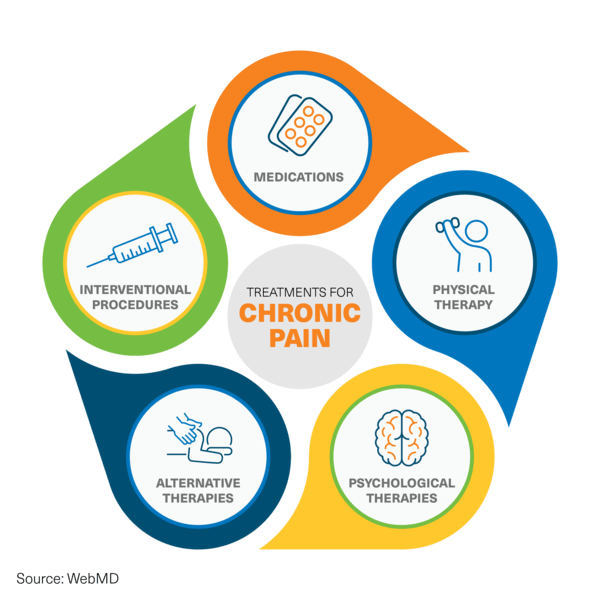Safe and Effective Ways to Manage Chronic Pain
Chronic pain is on the rise, and it might be affecting you or someone you know. One post-pandemic study estimated that 60 million American adults (nearly 1 in 4) suffer from chronic pain. That’s up from 50 million in 2019.
Chronic pain typically lasts for more than three months. Unlike acute pain, which is a direct response to an injury or illness and typically resolves once the underlying issue is treated, chronic pain persists and can be difficult to manage.
Unfortunately, some people experience chronic pain without evidence of an underlying cause. As you can imagine, when people have pain throughout the day, every day, it’s hard to enjoy life as usual.
What Causes Chronic Pain?
Chronic pain can affect any part of the body and vary in intensity from mild to severe. It can stem from a variety of sources. Common causes include:
- Arthritis or joint pain, like knee pain.
- Back pain, especially lower back.
- Cancer pain.
- Fibromyalgia.
- Headaches, including migraines.
- Neck pain.
- Neuropathic (nerve) pain.
Treatments for Chronic Pain
Because chronic pain affects the body and mind, effective treatment plans often include a combination of medical and non-medical strategies.
By working with your healthcare provider, you can create a plan to manage and reduce your pain safely and effectively. Some common treatments for chronic pain include:
- Medications: Over-the-counter pain relievers, prescription medications, and topical treatments may help manage pain. While prescription opioids for treating chronic pain may still be used in select cases, their use has declined significantly due to increased awareness of the risk of dependence and the broader opioid epidemic.
- Physical Therapy: Exercise and physical therapy may improve mobility and reduce pain.
- Psychological Therapies: Cognitive-behavioral therapy (CBT) and mindfulness may help manage the emotional aspects of chronic pain.
- Alternative Therapies: Acupuncture, massage, and chiropractic care may provide relief for some individuals.
- Interventional Procedures: Injections, nerve blocks, and other procedures can target specific pain areas.

Finding Pain Management Care
Chronic pain is a complex and challenging condition. By working with your healthcare provider to find the right treatment, individuals can find relief and improve their quality of life.
Remember, you don't have to face chronic pain alone. Capital’s Care Management team can also offer support.
Our team of experienced healthcare professionals can help you identify in-network providers, develop a care plan, and address non-medical barriers that could impact your treatment.
Visit Capital’s member portal, or contact Member Services (using the back of your ID card).
This is not medical advice and is not intended to be a substitute for professional medical advice, diagnosis, or treatment. Always seek the advice of your physician or other qualified health care provider with any questions you may have regarding a medical condition or treatment. The information provided is meant for a general audience. Capital Blue Cross and its affiliated companies believe this health education resource provides useful information but does not assume any liability associated with its use.
Source: “Managing Chronic Pain | Self-Management Education Programs | Learn More. Feel Better. | CDC.” CDC.Gov.
The information provided is meant for a general audience. Capital Blue Cross and its affiliated companies believe this health education resource provides useful information but does not assume any liability associated with its use.